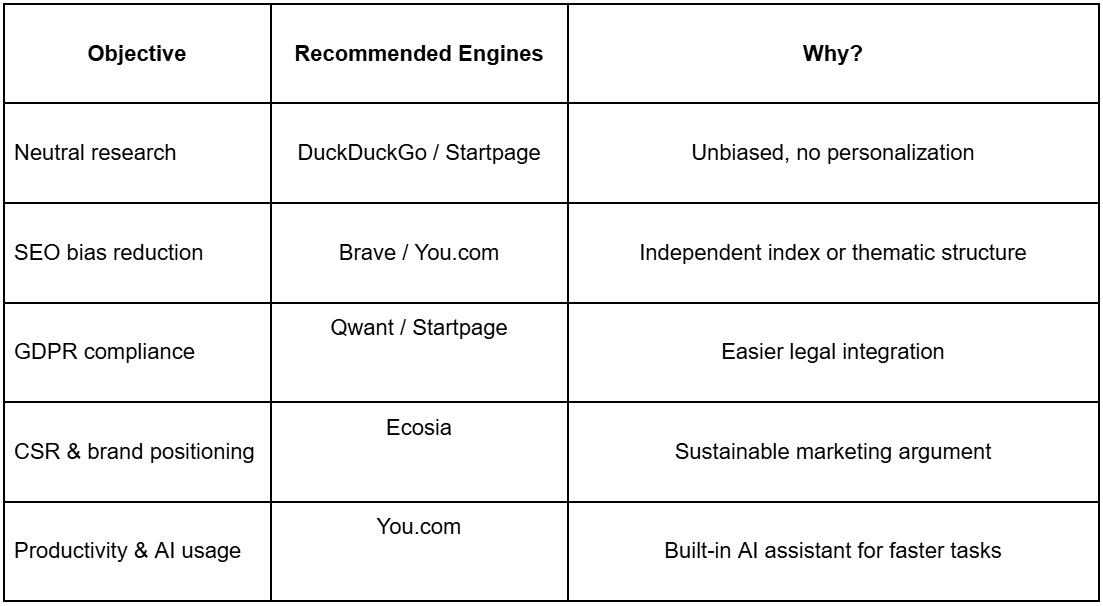Alternatives to Google Search: Strategic Challenges for Brands and E-commerce Players
25/06/25
9'
With over 91.6% global market share in 2024 according to Statcounter, Google remains by far the most used search engine. In France, this dominance is even stronger, with nearly 94% of searches conducted via Google.
However, this hegemonic position raises several concerns for digital professionals, e-commerce players, and B2B companies:
- Google captures the vast majority of organic traffic — but at what cost?
- What are the risks of depending solely on one player for visibility?
- Are there alternative opportunities to reach audiences, improve SEO strategies, or reduce your data footprint?
In this context, strategic reflection becomes necessary: diversifying search engine usage can unlock performance, compliance, and responsibility benefits.
Why Look Beyond Google? 5 Key Business Reasons
1. Reduce SEO/SEA Dependence
Click costs on Google Ads keep rising in competitive sectors (retail, health, tech). Sole reliance on Google exposes you to:
- Volatile ad budgets
- Tougher SEO competition
- Overdependence on algorithm updates
2. Run Neutral Competitive Monitoring
Google personalizes results heavily based on your history. For unbiased industry or competitive research, a neutral search engine becomes essential.
3. Protect Strategic and Internal Data
Searching through Google feeds its databases with your behavior. For product, legal, or marketing teams, this can be problematic. Alternative engines offer more confidential environments.
4. Strengthen Your CSR and GDPR Image
Using ethical engines like Ecosia or Qwant allows you to embrace sustainability or better meet GDPR obligations — especially in Europe.
5. Explore New Visibility Channels
Engines like You.com or Brave Search are developing their own advertising and SEO ecosystems with logic distinct from Google’s — and that’s worth testing.
Focus on 6 Alternative Engines for Digital Pros
You.com – The AI Assistant for Digital Teams
Used by freelancers, agencies, developers, marketers.
Strengths:
- Generates text, code, and content summaries
- Results are organized by source (e.g. trusted sites, forums, press)
- Customizable plugins for more productive workflows
Use cases:
Content briefs, industry monitoring, time-saving AI integration
DuckDuckGo – Confidential Search, Great for Benchmarks
- Pulls results from over 400 sources (Bing, Yahoo, Wikipedia…)
- No tracking, no ad cookies
- Ideal for unpersonalized product or competitor audits
Ecosia – The Sustainable Engine
- 1 tree planted every 45 searches
- 200+ million trees planted as of 2024
- Based on Bing, but no user tracking
- Supports CSR communication
Trees that have been planted thanks to Ecosia’s research systems
Qwant – GDPR-Native European Alternative
- French-developed, hosted 100% in the EU
- Complies with local data rules and GDPR
- Increasingly used as default engine in public and private sectors
Useful for: compliance, public marketing, institutional monitoring
Brave Search – The Independent Option for Tech & SaaS
- Built on an independent index (not Bing or Google)
- Integrated with the Brave browser
- Less standardized results → good for long-tail SEO tests
Startpage – Get Google Results, Without Google
- Shows Google results via anonymous proxy
- Doesn’t store IPs, history, or ad tracking
- Ideal for legal, sensitive or internal company research
Strategic Fit: When to Use Which Engine?

Best Practices for Integration
- Change default browser search to Qwant, Ecosia, Brave
- Include these tools in onboarding or internal IT guides
- Run SEO tests on niche queries using alternative engines
- Use APIs (e.g. You.com API or Brave Search API ) to enhance internal dashboards
As teams diversify their search and acquisition channels, maintaining accurate data across tools becomes increasingly important. Simple validation steps, such as using a free email checker, can help reduce errors when handling new contacts or campaign data. This supports more reliable workflows while remaining consistent with broader efficiency and compliance considerations discussed above.
The Unexpected Giants of Search: TikTok, Amazon, Apple & Co
Beyond ethical search engines, other digital giants are entering the search arena, leveraging huge user bases and native ecosystem integration.
1. TikTok – Search Engine for Gen Z
40% of consumers use TikTok as a search engine, with 64% of Gen Z and 49% of Millennials having already used it that way (SearchEngine Journal).
Originally designed as an entertainment platform, TikTok has seen its search function boom. Users now enter queries to discover products, tutorials, places, and even recipes. The highly personalized and immersive recommendation algorithm grabs attention and bypasses traditional SERPs.
Implications for brands:
- Rethink SEO to optimize it around short, engaging formats (vertical video, targeted hashtags).
- Anticipate a redefinition of purchase or information journeys: search is becoming “in-feed,” embedded directly within content.
2. Amazon – The go-to platform for product searches
Amazon is no longer just a marketplace: it’s the leading product search engine in the United States. For consumers, searching directly on Amazon helps bypass Google—especially when looking for comparisons, reviews, or alternatives.
Key figures:
Over 60% of e-commerce-related searches start on Amazon. (MarketingCharts.com)
Amazon’s algorithm, “A9,” prioritizes performance (conversion rate, reviews, logistics).
Opportunities for e-merchants:
- Optimize Amazon’s internal SEO: titles, visuals, enhanced descriptions, backend keywords.
- Develop an Amazon Ads strategy to move beyond a Google-only approach for flagship products.
3. Apple – The discreet but formidable competitor
With the rise of generative AI and a privacy-first strategy, Apple is preparing a silent revolution. The integration of ChatGPT into Siri, combined with a “Search” button in Safari (powered by Bing), signals a shift. Apple no longer wants to be just a gateway to Google.
Why this is strategic:
Apple controls the mobile experience (iPhone, iPad), giving it massive leverage to shape default search behavior.
Ongoing discussions with Perplexity.ai, a conversational search engine, aim to enhance its native services.
To watch:
The impact of Apple Intelligence on voice and contextual browsing.
The potential emergence of a native Apple search engine, independent from Google.
4. ChatGPT & Perplexity – Toward AI-assisted search
OpenAI (with ChatGPT) and Perplexity are introducing a new kind of search: conversational, synthetic, and proactive. Instead of browsing through ten pages of results, users get a contextualized answer in a few sentences—or even an actionable recommendation.
Professional use cases:
- Content summaries for content teams
- Concise industry research for analysts
- Prompt, script, or code generation for tech professionals
What sets Perplexity apart:
- Sourced results
- Smooth navigation
- Interconnected with other AIs (Claude, Mistral, etc.)
Search Is Becoming Multi-Faceted
The search landscape is undergoing a major transformation. It’s no longer just about keywords and SERPs. Users (and therefore businesses) are embracing multi-platform, conversational, video-first, and e-commerce-native search behaviors.
Diversifying search entry points also means diversifying business opportunities.
For brands, the challenge is no longer just ranking first on Google, but being present where search truly begins: in a TikTok video, an Amazon search bar, a voice query on Siri, or an AI-powered conversation.
Conclusion: Performance & Resilience Through Diversification
Google remains, even today, the beating heart of the web for most internet users. But its dominance is increasingly being challenged, both by specialized alternative search engines focused on privacy, ethics, or innovation, and by digital giants quietly reshaping the act of searching (TikTok, Amazon, Apple…).
In this context, brands, e-commerce players, and digital professionals have every reason to:
-
Move beyond a monolithic SEO/SEA strategy focused solely on Google
-
Diversify their visibility channels to be present where searches truly originate
-
Test and adopt tools aligned with their values, target audiences, and business goals
Adopting a multi-engine approach not only mitigates risks but also unlocks new business opportunities in the short, medium, and long term.
Your e-commerce library
Clarins x NetMonitor Success Story
Learn moreSuccess on Marketplaces
Learn moreCompetitive Intelligence
Learn moreSign up for our newsletter
By submitting this form you authorize Lengow to process your data for the purpose of sending you Lengow newsletters . You have the right to access, rectify and delete this data, to oppose its processing, to limit its use, to render it portable and to define the guidelines relating to its fate in the event of death. You can exercise these rights at any time by writing to dpo@lengow.com

Trending Posts
Marketplaces
The Top 10 Marketplaces in Europe (2026)
The e-commerce scene is a vibrant mix of marketplaces in Europe. These aren't just websites; they're bustling hubs where millions…
02/01/26
8'
Marketing channels
ChatGPT Ads and advertising on GenAI Search Engines: what you need to know
Advertising on generative AI-based search engines (GenAI) marks a new era in digital marketing. After two decades dominated by traditional…
18/01/26
8'
Marketplaces
The French Marketplace Landscape: What Brands Need to Know
France has quietly become Europe's marketplace laboratory. Lengow's exclusive ranking reveals why traditional retailers, not tech giants, dominate the game.…
08/01/26
6'
E-commerce Trends
Google’s Universal Commerce Protocol: The End of E-Commerce as We Know It?
On January 11, 2026, at the NRF Retail's Big Show in New York, Google unveiled the Universal Commerce Protocol (UCP),…
16/01/26
6'
Marketing channels
What the World Is Unboxing on TikTok and Instagram (Haul & Unboxing Index 2025)
Opening a package on camera has become much more than simple entertainment. In 2026, "haul" and "unboxing" videos serve as…
20/01/26
7'





